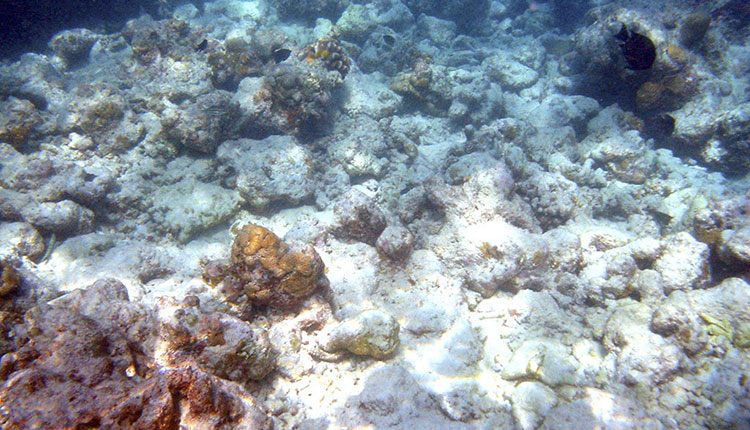Coral bleaching reaches 84% globally |
| By Edited by Kristin Ely |
January 2023 to March 2025 coral bleaching event is highest ever recorded. The most intense global coral bleaching event on record is still underway, according to the International Coral Reef Initiative (ICRI), with widespread impacts continuing more than a year after the event was officially declared. From January 1, 2023, to March 30, 2025, bleaching-level heat stress affected 84% of the world's coral reefs, with 82 countries, territories, and economies experiencing damage, ICRI reported. "We know coral bleaching is accelerating as our oceans warm, driven by the world’s continued reliance on fossil fuels," said President Surangel Whipps Jr. of Palau. "As an atoll nation, we see our reefs damaged and livelihoods threatened. We must urgently end the fossil fuel era and transition to a just, sustainable future powered by clean energy. Our oceans and the communities that depend on them cannot wait." Bleaching occurs when heat and other environmental stresses cause corals to expel the algae that live within them, leaving corals pale and vulnerable. If temperatures return to normal quickly, corals can recover. If not, they may die. Higher ocean temperatures remain the main driver of large-scale coral bleaching. ICRI noted that 2024 was the hottest year on record, with temperatures more than 1.5 degrees Celsius above pre-industrial levels. Record-breaking ocean temperatures and an unprecedented number of marine heatwaves contributed to the ongoing coral crisis. "There are many reasons for the demise of coral reefs; but let’s not beat around the bush," said Ambassador Peter Thomson, United Nations Secretary-General’s Special Envoy for the Ocean. "Corals are bleaching and dying primarily because the Ocean is warming at an alarming rate... If we want coral reefs to survive, we must drastically reduce our emissions and keep global warming to below 1.5 degrees Celsius." The severity of the fourth global bleaching event has surpassed all previous records. During the first event in 1998, about 21% of reefs experienced bleaching-level stress. That figure rose to 37% during the second event in 2010 and 68% during the third event from 2014 to 2017, according to ICRI. Scientists described the current event as "unprecedented" as early as May 2024. The standard Bleaching Alert Scale even had to be expanded, with new Levels 3-5 added to indicate the heightened threat to coral survival. At the highest new level, Level 5, more than 80% of a reef's corals are at risk of dying. Beyond their natural beauty, coral reefs are vital to marine ecosystems and human economies. About one-third of all known marine life relies on coral reefs, and roughly one billion people benefit from them directly or indirectly, ICRI stated. Reefs contribute $10 trillion in benefits, including food security, jobs, and coastal protection. However, live coral cover has been declining sharply. According to ICRI’s Global Coral Reef Monitoring Network (GCRMN), coral cover dropped 14% between 2009 and 2018, part of an estimated 50% loss since the 1950s due to a combination of local environmental threats and global climate change. Dr. Britta Schaffelke of the Australian Institute of Marine Science and GCRMN coordinator emphasized the importance of ongoing monitoring. "The fact that this most recent, global-scale coral bleaching event is still ongoing takes the world’s reefs into uncharted waters," she said. "We need to continue to observe and measure if and how reefs will recover and change, to help inform the combination of conservation measures most suited for a particular reef." Despite the worsening situation, experts say there are still opportunities to help reefs survive. ICRI outlined local solutions such as coral restoration, pollution reduction, sustainable fishing, and selective breeding programs to build resilience. However, these efforts must be matched by broader climate action. Experts estimate that investments in coral conservation need to increase sevenfold, and global warming must be limited to as close to 1.5 degrees Celsius as possible. Current climate policies, however, are projected to result in approximately 2.7 degrees of warming. ICRI warned that losing reefs would have devastating global consequences, potentially costing $500 billion per year by 2100 and undermining efforts toward sustainable development, poverty alleviation, and food security. "Coral reefs are humanity’s canary in the coal mine for much more than just climate change," said Dr. David Obura, Founding Director of CORDIO East Africa. "What we choose to do to save them... will determine their future and affect all life on earth, and everybody’s quality of life to the end of this century and beyond." ICRI emphasized that urgent global action is still possible to conserve, protect, and restore coral reefs for future generations. |
